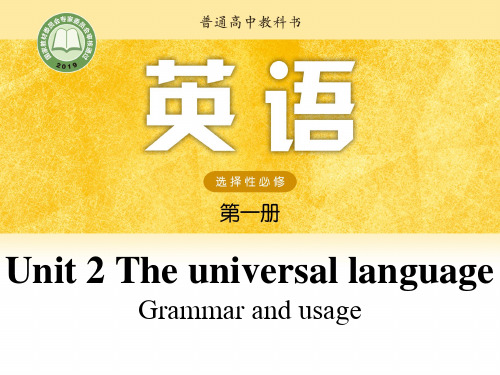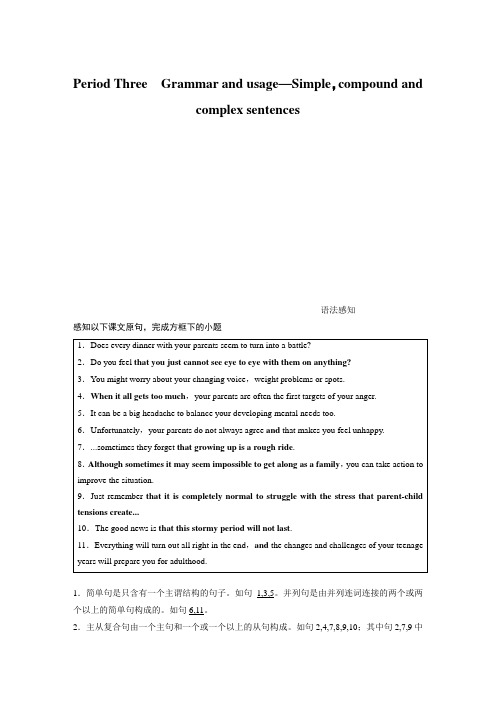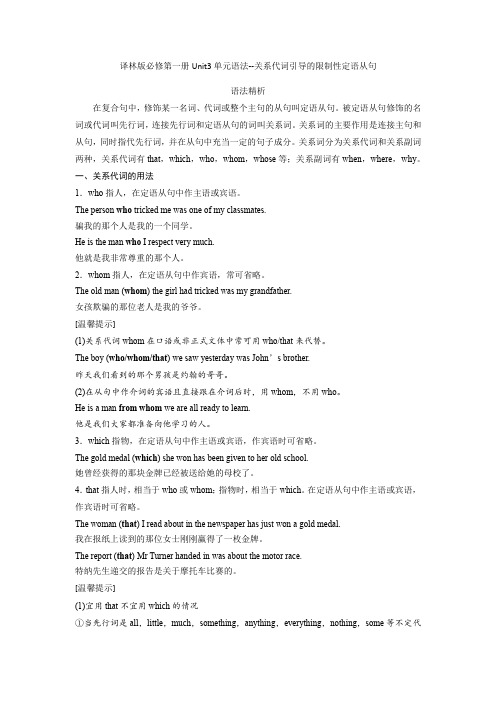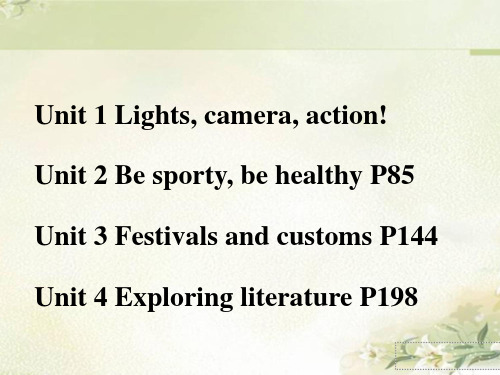译林版高中英语必修2讲义Unit 1 Section Ⅲ Grammar——现在完成时和现在完成进行时
译林版高中英语选择性必修第1册 U2L3 Grammar and usage

Exploring the rules
Verb-ing forms as subjects
Below is a story about a musician and his friend in ancient China. Find the sentences that use verb-ing forms as subjects and fill in the table below. The first one has been done for you.
Verb-ing forms as objects … everyone enjoyed listening…
Boya did not say anything before playing the qin, ... When Boya continued playing, ... ..., who never got tired of sharing his music with Zhong Ziqi. ... before going their separate ways, ...
In China’s Spring and Autumn and Warring States periods, there lived a man named Boya, who was a master of the qin. Playing the qin was his life. He played so well that everyone enjoyed listening to his music and thought highly of his techniques. However, Boya believed no one could understand his music until he met Zhong Zigi. Boya did not say anything before playing the qin, yet Zhong Ziqi was able to paint a picture of great mountain ranges in his mind. When Boya continued playing, Zhong Ziqi said he had heard the sound of a river flowing quickly. In fact, Boya had intended to call the piece High Mountains and Flowing Water. Having someone that really understood his music pleased Boya, who never got tired of sharing his music with Zhong Ziqgi. The two soon became great friends and before going their separate ways, they agreed to meet at the Mid-Autumn Festival the next year. However, Zhong Ziqi failed to show up on that day. When Boya learnt about Zhong Ziqi’s death, he was overcome with sorrow. He played High Mountains and Flowing Water in front of Zhong Ziqi’s grave. After he finished playing the piece, he destroyed the qin and said, “Since the only person that understands my music is gone, it’s no use keeping the qin.”
译林版高中英语必修一Unit2 Period Three Grammar and usage—Simple,compound and complex sentences

Period Three Grammar and usage—Simple,compound andcomplex sentences语法感知感知以下课文原句,完成方框下的小题1.简单句是只含有一个主谓结构的句子。
如句1,3,5。
并列句是由并列连词连接的两个或两个以上的简单句构成的。
如句6,11。
2.主从复合句由一个主句和一个或一个以上的从句构成。
如句2,4,7,8,9,10;其中句2,7,9中that引导宾语从句;句4中when引导时间状语从句;句8中although引导让步状语从句;句10中that引导表语从句。
语法精析1.简单句只含有一个主谓结构的句子叫简单句。
有八种基本类型:(1)主谓:主语+谓语(2)主系表:主语+连系动词+表语(3)主谓宾:主语+谓语+宾语(4)主谓宾宾:主语+谓语+间接宾语+直接宾语(5)主谓宾补:主语+谓语+宾语+宾语补足语(6)主谓状:主语+谓语+状语(7)主谓宾状:主语+谓语+宾语+状语(8)存现句:表示事物存在、出现、消失的句式。
2.并列句由两个或两个以上不分主次、相互独立的简单句构成的句子叫并列句。
并列句通过并列连词、连接副词和分号三种方式连接起来。
常见的并列连词:(1)and表示平行、顺接、递进等He was cleaning the room and his children were playing outside.他在打扫房间,他的孩子们在外面玩耍。
(2)but表示转折(但是,然而)His son came back,but he was still concerned.他儿子回来了,但是他仍然很担心。
(3)for表示原因或理由It must have rained yesterday evening,for the ground is wet.昨晚准是下雨了,因为地面是湿的。
(4)so表示结果(所以)The manager was ill so I went to the press conference in his place.经理病了所以我代他去参加发布会。
第08讲必修二Unit3Grammar高一英语精品讲义(译林版2020)

第08讲必修二Unit3 Grammar (解析版)-【帮课堂】2022-2023学年高一英语同步精品讲义(译林版2020必修第二册)【目标导航】本单元的语法是过去将来时【知识精讲】1. 表示就过去某一时间而言将要发生的动作或存在的状态。
2. 过去将来时常用于间接引语或宾语从句中,当主句谓语动词用过去时态时。
He said he would go to the north for the holiday. 他说他将去北方去度假。
They wanted to know when you would finish the article. 他们想知道什么时候你会完成这篇文章。
3. 过去将来还可用下列形式来表达,但含义有所不同:1)was/were going to do:常用于口语中,表示预言、意图或打算等。
We were just going to leave when Jean fell down on the floor.我们正打算离开这时Jean摔倒在地上。
I was going to visit the factory but in the end I went to the country.我当时打算去参观工厂的,但最终我去乡下了。
2)was /were about to do:常用来表示即将发生的动作“刚要/正要做某事”。
When she was about to go out of the house, she looked back to see if the lights were off.当她正要走出房间的时候,她回头看灯是否关了。
3)was/were on the point of doing :也可以表示过去将来时I'm glad you have come.I was on the point of calling you,but you've saved me the trouble now.很高兴你来了。
Unit 3 Grammar 讲义-高一英语牛津译林版(2020)必修第一册

译林版必修第一册Unit3单元语法--关系代词引导的限制性定语从句语法精析在复合句中,修饰某一名词、代词或整个主句的从句叫定语从句。
被定语从句修饰的名词或代词叫先行词,连接先行词和定语从句的词叫关系词。
关系词的主要作用是连接主句和从句,同时指代先行词,并在从句中充当一定的句子成分。
关系词分为关系代词和关系副词两种,关系代词有that,which,who,whom,whose等;关系副词有when,where,why。
一、关系代词的用法1.who指人,在定语从句中作主语或宾语。
The person who tricked me was one of my classmates.骗我的那个人是我的一个同学。
He is the man who I respect very much.他就是我非常尊重的那个人。
2.whom指人,在定语从句中作宾语,常可省略。
The old man (whom) the girl had tricked was my grandfather.女孩欺骗的那位老人是我的爷爷。
[温馨提示](1)关系代词whom在口语或非正式文体中常可用who/that来代替。
The boy (who/whom/that) we saw yesterday was John’s brother.昨天我们看到的那个男孩是约翰的哥哥。
(2)在从句中作介词的宾语且直接跟在介词后时,用whom,不用who。
He is a man from whom we are all ready to learn.他是我们大家都准备向他学习的人。
3.which指物,在定语从句中作主语或宾语,作宾语时可省略。
The gold medal (which) she won has been given to her old school.她曾经获得的那块金牌已经被送给她的母校了。
4.that指人时,相当于who或whom;指物时,相当于which。
新教材牛津译林版高中英语必修第二册全册优秀教学课件

➢ Doctors and nurses rushed to the scene of the accident to carry out the rescue.医护人员迅速赶到了事故地点,实施救援。
advertise a product 做广告宣传产品
②comedy n.喜剧,喜剧片 拓展:comedian n.喜剧演员,滑稽演员
comic adj.喜剧的 a comic actor 喜剧演员
③documentary n.纪录影片,纪实广播(或电视)节目 ④fantasy n. 幻想作品;幻想,想象 拓展:fantastic adj.富于想象的;不切实际的;极好的, 了不起的
他告诉我们的那个方法很有效。 (关系词在从句中作宾语) ➢ The way that which was thought up by him was similar to Tom's.
他想出的这个方法和汤姆的类似。 (关系词在从句中作主语)
词汇
易混词语 happen
break out take place
区别
意为"发生,出现",含有偶然或突发的意味,此时用物作主语, 不用于被动语态。 ➢ It’s impossible for us to predict what will happen next. 我们不可能预测接下来会发生什么。
句型
⑤after 引导时间状语从句。 you would expect是定语从句,修饰the way。
2019-2020同步译林英语必修二新突破讲义:Unit 2 Section Ⅲ Grammar——将来进行时和过去将来时

安徽省行政事业性收费票据管理办法文章属性•【制定机关】安徽省人民政府•【公布日期】1998.05.27•【字号】安徽省人民政府令[第104号]•【施行日期】1998.05.27•【效力等级】地方政府规章•【时效性】失效•【主题分类】财政其他规定正文安徽省人民政府令(第104号)《安徽省行政事业性收费票据管理办法》已经1998年5月5日省人民政府第6次常务会议通过,现予发布施行。
省长回良玉一九九八年五月二十七日安徽省行政事业性收费票据管理办法第一章总则第一条为了加强行政事业性收费票据管理,规范行政事业性收费行为,维护公民、法人或者其他组织的合法权益,根据国家有关规定,制定本办法。
第二条本办法所称行政事业性收费票据(以下简称收费票据),是指国家机关、事业单位和社会团体(以下简称收费单位)根据有权机关批准的行政事业性收费项目和标准,向管理和服务对象实施行政事业性收费时开具的收款凭证。
收费票据是收费单位和被收费单位财务收支的法定凭证和会计核算的原始凭证,是财政、物价、审计、税务部门进行监督检查的依据。
第三条县级以上地方人民政府财政部门是本行政区域内收费票据的主管部门,按照本办法规定的管理权限,负责收费票据的监督管理工作。
第四条物价、审计、公安、税务等部门以及收费单位的主管部门应当在各自的职责范围内,做好收费票据的管理工作。
第二章收费票据的种类和适用范围第五条收费票据分为通用收费票据和专用收费票据两类。
通用收费票据是指能够满足一般收费特点、具有通用性的收费票据。
专用收费票据是指为某一特定的收费项目设立、具有特定格式要求的收费票据。
收费票据的具体种类、联数、内容、式样、规格等由省人民政府财政部门规定。
第六条收费票据适用于不征收营业税并纳入预算管理或者财政专户管理的行政性收费、事业性收费和基金(含专项资金、附加)项目。
凡涉及征收营业税的行政事业性收费和基金项目,均应当纳入税务管理,进行税务登记,并使用税务发票。
译林版高中英语必修1讲义Unit 2 Section Ⅲ Grammar——定语从句(Ⅱ)

Section ⅢGrammar——定语从句(Ⅱ)语境自主领悟先观察原句后自主感悟①In the corner,there is a garbage canaround which are pieces of garbage andwaste paper.②My cousin is a person with whom Istayed when I was young.③I often think of the moment when I firstsaw her.④Perhaps there is a reason why thehouse is in a mess.⑤Mike wants to work in a country wherethere are a lot of forests.1.例句①②中含“介词+关系代词”引导的定语从句,而且关系词作介词的宾语。
2.例句③④⑤中含关系副词引导的定语从句,而且,关系副词在从句中作状语。
why作原因状语;where作地点状语;when作时间状语。
一、“介词+关系代词”引导的定语从句1.在“介词+关系代词”引导的定语从句中,关系代词通常是which和whom,which指物,whom指人。
[即时训练1]用“介词+关系代词”引导的定语从句合并句子①The reason is that he was ill yesterday.He did not hand in his homework for that reason.→The reason for which he did not hand in his homework is that he was ill yesterday.②The English play was a great success.The students acted in it at the New Year's party.→The English play in which the students acted at the New Year's party was a great success.③Who is the man?You shook hands with him just now.→Who is the man with whom you shook hands just now?2.“介词+which”在定语从句中作时间、地点、原因状语,相当于关系副词when,where,why。
译林版必修一Unit 2Section Ⅲ Grammar—简单句、并列句和主从复合句

Section ⅢGrammar——简单句、并列句和主从复合句①We know that being a teenager is sometimes difficult.②If your problem is a new one,write a post about it.③You can look through these articles to find advice on your problem.④It is likely that the matter has already been discussed on our forum.⑤Our website has many articles about teenagers’ physical and mental health.⑥Shall I send the book to you,or will you come to get it?⑦The little girl who you saw yesterday is my cousin.⑧Users are encouraged to post their problems,and they will get some advice from our experts and other forum users.⑨I have travelled to many places,but I still want to visit more.【自主发现】1.简单句:③⑤2.并列句:⑥⑧⑨3.主从复合句:①②④⑦;句①中含有宾语从句;句④中含有主语从句;句②中含有状语从句;句⑦中含有定语从句一、简单句(simple sentences)1.概念:简单句是由一个主语(或并列主语)和一个谓语(或并列谓语)构成的句子。
2.分类(1)一个主语+一个谓语She│enjoyed collecting stamps.她喜欢收集邮票。
- 1、下载文档前请自行甄别文档内容的完整性,平台不提供额外的编辑、内容补充、找答案等附加服务。
- 2、"仅部分预览"的文档,不可在线预览部分如存在完整性等问题,可反馈申请退款(可完整预览的文档不适用该条件!)。
- 3、如文档侵犯您的权益,请联系客服反馈,我们会尽快为您处理(人工客服工作时间:9:00-18:30)。
Section ⅢGrammar——现在完成时和现在完成进行时一、现在完成时1.现在完成时的用法(1)表示过去发生的动作产生的结果或对现在造成的影响。
动作虽然发生在过去,但落脚点在现在。
I've forgotten his telephone number.我忘记了他的电话号码。
(没法联系他了)I haven't finished reading this book yet,so I can't return it to the library.这本书我还没有看完,所以不能把它还给图书馆。
(2)表示动作或状态从过去某时开始一直延续到现在,并可能延续下去。
常与so far,by now,up to now,since,for a long time,up till now,in the past/last few years 等表示一段时间的状语连用。
He has worked here for twenty years by now.到现在为止,他已经在这儿工作20年了。
Up to now,we have received no letters from her.到现在为止,我们没有收到她一封信。
[名师点津](1)该用法中的动词多是延续性动词,不能是非延续性动词或趋向动词。
(2)非延续性动词用于否定句可以表示否定的状态,故可以用来表示状态的持续。
(3)由since引导的时间状语中,since后面的时间名词必须是“时间点”,而不能是“时间段”;而for短语中的时间名词必须是“时间段”(有时for可省去)。
I've known him since 1980.我从1980年就认识他了。
I have learnt English (for) many years.我学英语已很多年了。
[即时演练1]用所给动词的适当形式填空①The price has gone (go)down,but I'm not sure whether it will remain so.②All the windows have been painted (paint),and they look new.③I have read (read)many reports about the UFO recently.④In the last few years,China has made (make) great achievements in environmental protection.⑤His first novel has received (receive) good reviews since it came out last month.2.现在完成时的常用句型(1)It/This is the first/second/...time that+主语+谓语部分(常用现在完成时)(2)It has been+一段时间+since...(3)It/This/That is the+最高级+名词+定语从句(定语从句常用现在完成时)It is the first time that I've heard of the story about Crop Circles.这是我第一次听说麦田怪圈的故事。
This is the best film(that)I've ever seen.这是我所看过的最好的一部电影。
3.在时间或条件状语从句中,现在完成时可以代替将来完成时If you have done the experiment,you will realize the theory better.如果你做过这个实验,你会更好地理解这个理论的。
4.现在完成时和一般过去时的区别①cleanWe cleaned the classroom just now.We have already cleaned the classroom.②workI worked in the factory for 3 years,now I run a restaurant.I have worked in the factory for 3 years.③—Kevin,you look worried.Anything wrong?—Well,I took (take) a test and I'm waiting for the result.二、现在完成进行时1.现在完成进行时的用法(1)表示动作从过去某一时刻开始一直持续到现在并有可能延续下去,更强调动作的延续性,常与for,since等引出的时间状语连用。
They have been living here for 10 years.他们住在这里10年了。
I have been waiting for you about half an hour.我等你大概半个小时了。
(2)表示动作的反复性。
They have been discussing the matter several times this year.他们今年已经数次讨论那件事了。
(3)表示某种感情色彩。
I have been waiting to see you for a long time.长久以来,我一直等着见你。
[名师点津]表示状态的动词不能用于现在完成进行时。
我认识他已经好几年了。
I have known him for years. (√)I have been knowing him for years. (×)[即时演练3]用所给动词的适当形式填空①—Where is Peter? I can't find him anywhere.—He went to the library after breakfast and has been writing (write) his essay there ever since.②The girl has a great interest in sports and has been taking (take) badminton classes twice a week over the last three years.③In order to find the missing child,villagers have been doing (do) all they can over the past five hours.2.现在完成进行时和现在完成时的区别他写了一封信。
(信已写好)He has been writing a letter.他一直在写一封信。
(信尚未完成)Have you met him recently?你最近见过他吗?(现实结果)Have you been meeting him recently?你最近常和他见面吗?(动作的反复)My father has lost his keys.我父亲把钥匙丢了。
(陈述事实)My father has always been losing his keys.我父亲总是丢钥匙。
(“有责怪或无奈”之意)[即时演练4]用所给动词的适当形式填空①That famous painting has been missing (miss) for two weeks now.Police have been looking (look) for it.②I have been writing (write) the book,but I still haven't finished (not finish) it.③They have never learnt (learn) to swim.④We have been looking (look) forward to our summer vacation.Ⅰ.用所给动词的适当形式填空1.Sorry,I'm full.I have had (have) supper already.2.Maria has been learning (learn) English for two years and she does well in it.3.Li Ming went (go) abroad last year.We haven't heard (not hear) from each other since then.4.Hello,Tom.I have been looking (look) for you all morning.Where have you been?5.We have been contributing(contribute)to the prosperity of national instruments of China with reasonable price,professional standard and high quality services.6.How many unexplained stories have you heard (hear)of?7.In the past few days,the detective has looked/has been looking (look) into the case.8.They have been building (build) the bridge base since last week.9.The boy has not shown (not show) up since he went missing.10.Danny has worked (work) hard for long to realize his dream and now he is popular.Ⅱ.单句改错(每小题仅有1处错误)1.She lives in Beijing since she came to China.lives→has lived 2.They are friends for 10 years.are →have been3.In the last ten years,many changes took place in my hometown.took→have taken 4.I heard nothing from him up to now.heard前加have 5.His hands are very dirty,because he has painting the door.painting前加been 6.I have been drunk five cups of coffee this afternoon.drunk→drinking 7.When I saw him, he has not eaten anything for two days.has→had 8.It is five years since Mr Smith come to teach in our school.come→came 9.I'm glad to tell you that you passed the exam.passed前加have 10.The three of us have travelled around Europe for about a month last summer.去掉have。
